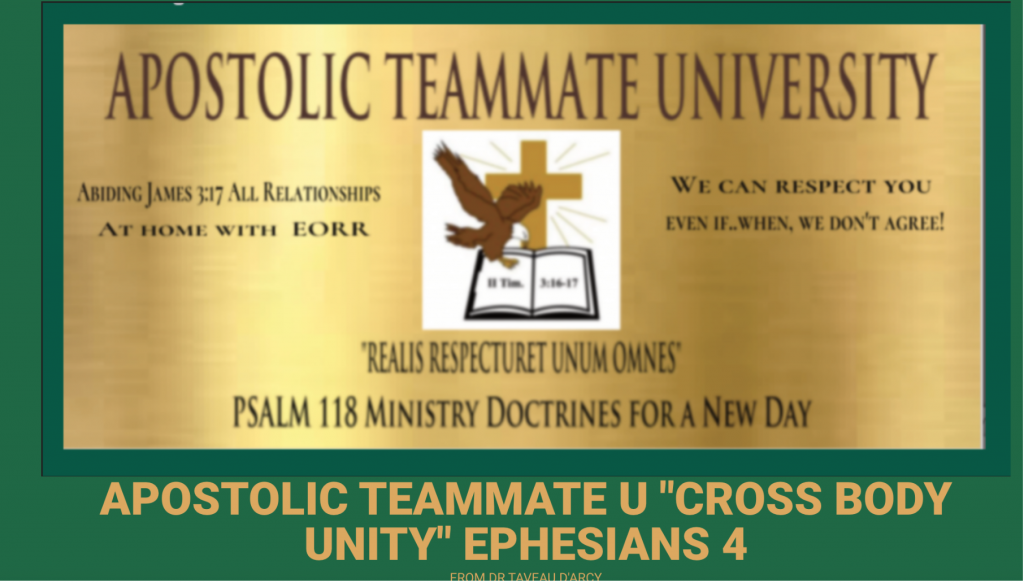Above..yet we’ll see.
Psalm 118: EORR Cross Body Unity Doctrines for a New Day
And an Isaiah 1:18 “Relationship” Last Days Big Reminder
“Come let us reason together, though your sins be as scarlet, He will wash them white as snow”
(meeting, relating, giving relationship respect not vilifying, accuser name calling)
Apostolic CBU Teammate University
www.cbuteammate.com is forthcoming
Psalm 118 EORR Cross Body Unity Doctrines for a New Day
From Pastor Taveau D’Arcy (C) 2024, All Rights Reserved under International Copyright Law.
Psalm 118 (KJV)
1 O give thanks unto the Lord; for he is good: because his mercy endureth forever.
2 Let Israel now say, that his mercy endureth forever.
3 Let the house of Aaron now say, that his mercy endureth forever.
4 Let them now that fear the Lord say, that his mercy endureth forever.
5 I called upon the Lord in distress: the Lord answered me, and set me in a large place.
6 The Lord is on my side; I will not fear: what can man do unto me?
7 The Lord taketh my part with them that help me: therefore shall I see my desire upon them that hate me.
8 It is better to trust in the Lord than to put confidence in man.
9 It is better to trust in the Lord than to put confidence in princes.
10 All nations compassed me about: but in the name of the Lord will I destroy them.
11 They compassed me about; yea, they compassed me about: but in the name of the Lord I will destroy them.
12 They compassed me about like bees; they are quenched as the fire of thorns: for in the name of the Lord I will destroy them.
13 Thou hast thrust sore at me that I might fall: but the Lord helped me.
14 The Lord is my strength and song, and is become my salvation.
15 The voice of rejoicing and salvation is in the tabernacles of the righteous:
16 The right hand of the Lord is exalted: the right hand of the Lord doeth valiantly.
17 I shall not die, but live, and declare the works of the Lord. 18 The Lord hath chastened me sore: but he hath not given me over unto death.
19 Open to me the gates of righteousness: I will go in to them, and I will praise the Lord:
20 This gate of the Lord, into which the righteous shall enter.
21 I will praise thee: for thou hast heard me, and art become my salvation.
22 The stone which the builders refused is become the head stone of the corner.
23 This is the Lord’s doing; it is marvelous in our eyes.
24 This is the day which the Lord hath made; we will rejoice and be glad in it.
25 Save now, I beseech thee, O Lord: O Lord, I beseech thee, send now prosperity.
26 Blessed be he that cometh in the name of the Lord: we have blessed you out of the house of the Lord. 7 God is the Lord, which hath showed us light: bind the sacrifice with cords, even unto the horns of the altar.
28 Thou art my God, and I will praise thee: thou art my God, I will exalt thee.
29 O give thanks unto the Lord; for he is good: for his mercy endureth forever.

How Psalm 118 Applies to Apostolic Resilience
Psalm 118 is a psalm of thanksgiving, but beyond its surface message, it contains deep layers of insight about enduring faith, divine deliverance, and the continual shaping of a servant leader. It resonates especially with those in long-term ministry leadership, such as those called into apostolic roles. Here’s how Psalm 118 applies to apostolic resilience, a crucial characteristic for anyone in senior or apostolic ministry:
Section 1: Praise and Recognition of God’s Everlasting Mercy (Verses 1-4)
The Psalm opens with an emphatic declaration of gratitude:
1 O give thanks unto the Lord; for he is good: because his mercy endureth forever.
2 Let Israel now say, that his mercy endureth forever.
3 Let the house of Aaron now say, that his mercy endureth forever.
4 Let them now that fear the Lord say, that his mercy endureth forever.
These verses remind us that the core of our ministry lies in recognizing and proclaiming God’s unchanging mercy through every season of life.
Application for Leaders Today:
Apostolic leaders must consistently anchor themselves in the truth of God’s mercy. Whether facing discouragement or elation, returning to this foundational truth provides the strength to persevere.
Section 2: God’s Deliverance in Times of Distress (Verses 5-7)
The Psalmist recounts a moment of deep danger, our heightened big distress:
5 I called upon the Lord in distress: the Lord answered me, and set me in a large place.
6 The Lord is on my side; I will not fear: what can man do unto me?
7 The Lord taketh my part with them that help me: therefore shall I see my desire upon them that hate me.
This imagery highlights ‘the extremely tight squeezes” the dire extreme many pressures that war against us in certain seasons, situations and in our darkest moments. However as we trust, continue to cast our cares and fears, worries, daily, in slow mo time and His due fashion..methods…God will deliver us and use it (meaning in hindsight) to expand our boundaries.
Application for Leaders Today:
The path to ministry maturity often involves distress. Leaders must trust that God uses trials to fortify and enlarge their influence, preparing them for greater ministry impact.
Section 3 NOTE v. 8 and V 9 which follows are the middle verses of the Old and New Testament(Verses 8-9)
8 It is better to trust in the Lord than to put confidence in man.
9 It is better to trust in the Lord than to put confidence in princes. **
**(leaders, elders, systems)
Application for Leaders Today:
In ministry, it’s vital to root our confidence in God’s guidance instead of seeking validation from human structures or systems. Trusting in the Lord frees leaders from the weight of expectation imposed by others.
Section 4: Facing Opposition with the Lord’s Strength (Verses 10-12)
10 All nations compassed me about: but in the name of the Lord will I destroy them.
11 They compassed me about; yea, they compassed me about: but in the name of the Lord I will destroy them.
12 They compassed me about like bees; they are quenched as the fire of thorns: for in the name of the Lord I will destroy them..
Opposition is an inevitable reality in ministry, yet the Psalmist reassures us of God’s deliverance.
Application for Leaders Today:
When confronted with conflict or adversity, apostolic leaders are called to stand firm. With the Lord as our strength, we can confront opposition with confidence.
Section 5: Divine Help in Critical Moments (Verses 13-14)
13 Thou hast thrust sore at me that I might fall: but the Lord helped me.
14 The Lord is my strength and song, and is become my salvation.
These verses reflect the moments when it feels like we are at the brink, yet God’s strength upholds us.
Application for Leaders Today:
Leadership often comes with the weight of near-collapse. These critical moments highlight our dependence on God and the necessity of humility in our calling.
Section 6: The Voice of Rejoicing and Salvation (Verses 15-16)
15 The voice of rejoicing and salvation is in the tabernacles of the righteous:
16 The right hand of the Lord is exalted: the right hand of the Lord doeth valiantly.
Here, we see the outcome of trusting in the Lord—joy and salvation are prominent in the lives of the righteous. The right hand of the Lord signifies His power and authority, assuring us that He acts decisively on behalf of His people.
Application for Leaders Today:
In ministry, leaders must celebrate and cultivate a culture of rejoicing. Acknowledging God’s active presence in our lives, especially during victories, reinforces our confidence in His sovereignty and strength.
Section 7: Living to Declare the Works of the Lord (Verses 17-18)
17 I shall not die, but live, and declare the works of the Lord.
18 The Lord hath chastened me sore: but he hath not given me over unto death.
Ministers are preserved to declare God’s works, even amid trials…despite how it seems, might appear!
Application for Leaders Today:
Each trial serves a purpose, equipping leaders to testify of God’s faithfulness and goodness. Ministry is about being a living testament to God’s sustaining power.
Section 8: Opening the Gates of Righteousness (Verses 19-21)
19 Open to me the gates of righteousness: I will go in to them, and I will praise the Lord:
20 This gate of the Lord, into which the righteous shall enter.
21 I will praise thee: for thou hast heard me, and art become my salvation.
These verses symbolize the invitation to enter into God’s presence and the importance of worship as an integral part of the believer’s life. The gates of righteousness signify a place of acceptance and refuge for the faithful, highlighting the profound relationship between salvation and praise.
Application for Leaders Today:
Apostolic leaders should encourage their communities to pursue righteousness actively and enter into God’s presence through worship. Acknowledging God’s role in our salvation fosters a culture of gratitude and reverence.
Section 9: Continually Rejected, Accused and Despised..yet then Victory (Verses 22-23)
22 The stone which the builders refused is become the head stone of the corner.
23 This is the Lord’s doing; it is marvelous in our eyes.
Rejection can be part of the journey for leaders, but God often repositions those overlooked for His great purposes.
Application for Leaders Today:
Ministers may experience rejection, yet these moments can become pivotal in fulfilling God’s plan. Leaders must view rejection as divine redirection, trusting that God has a greater purpose.
Section 10: Rejoicing in God’s Timing (Verse 24)
24 This is the day which the Lord hath made; we will rejoice and be glad in it.
This verse emphasizes the importance of suffering, prolonged endurance, many big trials..yet the victory will certainly come..just rely and trust on God’s perfect timing.
Application for Leaders Today:
Rejoicing in every season—especially during delays or challenges—is essential. Acknowledging God’s timing builds resilience and faithfulness.
Section 11: Salvation and Prosperity (Verses 25-27)
25 Save now, I beseech thee, O Lord: O Lord, I beseech thee, send now prosperity.
26 Blessed be he that cometh in the name of the Lord: we have blessed you out of the house of the Lord.
27 God is the Lord, which hath showed us light: bind the sacrifice with cords, even unto the horns of the altar.
This call for divine intervention is crucial, reminding us that prosperity comes from the Lord.
Application for Leaders Today:
Ministers should seek God’s guidance in their efforts for growth and success, understanding that true prosperity is rooted in His will and purpose.
Section 12: Acknowledgment and Exaltation (Verses 28-29)
28 Thou art my God, and I will praise thee: thou art my God, I will exalt thee.
29 O give thanks unto the Lord; for he is good: for his mercy endureth forever.
These closing verses encapsulate the commitment to worship God and recognize His sovereignty.
.
Psalm 118 Keeping A Perspective.. Will Intentionally Supplant Modern Day Mostly (tones, acts, methods) which Accuse, Name Call, Defile, or Demean Certain Subcultures, Segments of the Global Population (inside or outside of the “cloistured church” ..As it’s usually about Accustomed Big Apostolic Tones and Methodology
The apostolic tone is essential for ministry, combining humility, love, truth, and respect in a way that engages people without compromising the gospel. As for methodology, adjusting it to fit the current context means adapting the approach, strategies, and platforms to better communicate Christ’s unchanging message. This balance allows the ministry to reach people where they are while maintaining a steadfast commitment to biblical truths.
Apostolic Reflection: The Journey of Faith, Trust, and Leadership Formation
Psalm 118 offers profound insights into the journey of being shaped into a seasoned ministry leader. It reflects the long haul of faith, including both the struggles and victories that come with being molded by the Lord. For anyone called into apostolic or senior ministry office, this Psalm echoes many aspects of the walk, whether in times of personal distress or triumph, times of loneliness, or shared joy in the Lord’s mercy.
Verses 1-4: Praise and Recognition of God’s Everlasting Mercy
The opening of Psalm 118 emphasizes the eternal mercy of God. In a modern Christian ministry context, these verses call the apostolic leader to continuously give thanks, recognizing God’s unchanging mercy through every season of life. This reflects the foundation of our ministry—the understanding that God’s mercy extends far beyond our personal trials or victories.
Application for Leaders Today: No matter where we are in ministry, we must always anchor ourselves in God’s mercy. In times of discouragement or loneliness, especially in the calling of apostolic ministry, we can return to this truth: His mercy endures forever.
Verses 5-7: God’s Deliverance in Times of Distress
The Psalmist recalls a moment of distress, yet proclaims God’s deliverance and enlargement of his territory. This imagery of being “set in a large place” points to times when, after periods of difficulty or misunderstanding, the Lord brings expansion and favor. For Christian leaders, this reflects seasons where God uses trials to strengthen, expand, and promote His chosen vessels.
Application for Leaders Today: The road to ministry maturity often includes distress and opposition, but the Lord is faithful to deliver. Leadership demands resilience and trust in God during those tough times. He will enlarge our capacity and influence as we remain steadfast.
Verses 8-9: Trust in the Lord Over Human Strength
These verses urge a trust in God over reliance on human authority or power. Many in ministry are tempted to place confidence in influential people, organizations, or leaders, but the Psalmist reminds us that true security comes from the Lord alone.
Application for Leaders Today: Especially in the context of ministry, we are called to trust God over human systems, politics, or authority. It’s a reminder to root our leadership in the guidance of the Holy Spirit and not in the approval of men or secular structures.
Verses 10-12: Facing Opposition with the Lord’s Strength
The Psalmist speaks of being surrounded by enemies but is confident in God’s deliverance. For apostolic leaders, opposition is inevitable—whether from worldly forces or spiritual adversity. Yet, in the name of the Lord, we overcome.
Application for Leaders Today: Apostolic leaders often find themselves surrounded by conflict or spiritual opposition. The key is to not waver but stand firm, knowing that the name of the Lord is our banner and strength. God equips His leaders for every battle they face.
Verses 13-14: Divine Help in Critical Moments
In verse 13, the Psalmist confesses being pushed to the point of falling, but the Lord intervenes. Every minister can relate to this—moments where it feels like we are at the brink, only to experience God’s strength upholding us.
Application for Leaders Today: Leadership is not without moments of near-collapse, but those are the very times when God’s strength becomes evident. This helps us remain humble, reliant, and firm in our calling.
Verses 17-18: Living to Declare the Works of the Lord
These verses highlight a crucial reality for any Christian minister: despite the many hardships, we are preserved to declare the works of God. Apostolic leaders, in particular, are called to be living testimonies of God’s faithfulness, declaring His works through their own journeys.
Application for Leaders Today: Every trial, every correction by the Lord, serves a purpose. Apostolic ministry is about declaring the works of the Lord to the Body of Christ and the world, showing that the Lord sustains, guides, and corrects His leaders for His glory.
Verses 22-23: Rejection and Vindication
“The stone which the builders refused is become the head stone of the corner.” For many in leadership, rejection can be a part of the process. Yet, God’s plan often involves taking those who were once overlooked or rejected and positioning them for great purpose.
Application for Leaders Today: In ministry, rejection may come from peers, institutions, or even those we try to serve. However, just as Christ became the chief cornerstone, God can turn what seems like rejection into a pivotal point for His kingdom purposes. Leaders must see rejection as redirection toward God’s perfect plan.
Verse 24: Rejoicing in God’s Timing
“This is the day which the Lord hath made; we will rejoice and be glad in it.” This verse calls us to recognize God’s sovereign timing. In ministry, it’s easy to become frustrated with delays or struggles, but this passage reminds us to rejoice in the timing of the Lord.
Application for Leaders Today: We must learn to rejoice in each season of ministry, trusting that the Lord’s timing is perfect. Even when we feel out of sync with our own expectations, God’s timing is always worth celebrating.
Conclusion: A Psalm for Apostolic Resilience
Psalm 118 offers a blueprint for enduring the long haul of ministry. Its verses speak to the full experience of Christian leadership—distress, opposition, deliverance, joy, and trust in God’s unwavering mercy. Apostolic leaders must take these truths to heart, understanding that the road may be long and difficult, but the Lord is with us every step of the way.
By continually returning to the themes of praise, trust, deliverance, and declaring the works of the Lord, we remain anchored, strong, and prepared to lead with humility and resilience.
This Psalm is a testament to the truth that ministry is not a sprint but a marathon—one filled with highs and lows, yet rooted in the unwavering mercy and grace of God.
Pastor Taveau D’Arcy
EORR Cross Body Unity International
© 2024 Taveau D’Arcy All copyrights reserved under international copyright laws

Apostolic Tone : Balancing Authority with Grace
The apostolic tone refers to the manner in which apostles and Christian leaders communicate biblical truths and engage with others. It is rooted in the example of the apostles, particularly Paul, who demonstrated a tone of humility, grace, and boldness, balanced with love and truth. The apostolic tone reflects a leadership style that is both firm in doctrine and gentle in approach, embodying the servant leadership modeled by Christ.
Key characteristics of an apostolic tone include:
- Humility and Compassion – Apostles like Paul were aware of their own weaknesses and humanity, often referring to themselves as servants of Christ. In 1 Corinthians 2:3-4 (KJV), Paul writes:
“And I was with you in weakness, and in fear, and in much trembling. And my speech and my preaching was not with enticing words of man’s wisdom, but in demonstration of the Spirit and of power.”
Paul’s tone was marked by humility and reliance on the Holy Spirit rather than on personal eloquence or worldly persuasion. - Boldness in Truth – While compassionate, the apostolic tone does not compromise on biblical truth. In Galatians 1:10 (KJV), Paul says:
“For do I now persuade men, or God? or do I seek to please men? for if I yet pleased men, I should not be the servant of Christ.”
An apostolic tone requires boldness to proclaim the truth of the gospel, even when it may not be popular or accepted by society. - Gentleness and Patience – Apostolic leaders are called to teach with gentleness and patience, knowing that transformation comes through the work of the Holy Spirit. 2 Timothy 2:24-25 (KJV) advises:
“And the servant of the Lord must not strive; but be gentle unto all men, apt to teach, patient, In meekness instructing those that oppose themselves…” - Respect and Love – An apostolic tone respects and loves all people, even those who may disagree with the gospel. Ephesians 4:15 (KJV) captures this balance:
“But speaking the truth in love, may grow up into him in all things, which is the head, even Christ.”
In essence, the apostolic tone reflects a blend of truth, love, humility, and boldness, aiming to guide others toward Christ without harshness or judgmental attitudes.
Adjusting Methodology in Ministry
While the truth of Scripture remains constant, the methodology of how we communicate and engage with others may need adjustment to effectively reach people in different contexts and cultures. Adjusting methodology refers to the practical strategies and approaches used in ministry, adapting them without compromising biblical truths.
Here’s how to adjust ministry methodology:
- Assess the Audience
Just as the apostle Paul adapted his approach depending on the culture and background of his audience, modern ministry must consider the context and needs of the people it seeks to reach. In 1 Corinthians 9:22 (KJV), Paul says:
“To the weak became I as weak, that I might gain the weak: I am made all things to all men, that I might by all means save some.”
This does not mean altering the message but presenting it in a way that is understandable and relatable to different groups. - Use New Platforms
In today’s world, technology and digital communication play a key role in how people interact and receive information. Ministry methodology can be adapted to include online platforms, social media, podcasts, and videos to share the gospel more widely. For example, Apostle Paul wrote letters to different churches, which was the most effective form of communication at that time. Today, digital platforms are a modern “letter” to reach the masses. - Contextualize without Compromising
It’s important to use language, examples, and cultural references that people can relate to without watering down the gospel. This means presenting biblical truths in ways that resonate with contemporary society while maintaining the integrity of Scripture. Acts 17:22-23 (KJV) provides an example of Paul doing this in Athens, where he acknowledges the Athenians’ religious practices and uses them as a bridge to present the gospel. - Engage with Respect and Dialogue
Adjusting methodology may also involve a more dialogue-based approach rather than a one-sided preaching style. Today’s culture often values conversation and mutual respect. By listening to people’s questions, concerns, and worldviews, the ministry can engage in a more relational and respectful way, leading others toward truth through discussion and shared understanding, much like Paul did in Acts 17 when he reasoned with the philosophers. - Address Current Issues
Ministry today must also speak to the real-life issues people are facing—whether it be societal, personal, or spiritual challenges. By addressing topics such as mental health, justice, relationships, and more, the church can demonstrate the relevance of the gospel in every aspect of life while still holding fast to biblical doctrine. - Be Flexible and Innovative
Ministry methodology should be flexible to adjust to new challenges and opportunities. This could mean forming new outreach initiatives, updating how discipleship is done (through online courses or small groups), or rethinking how sermons are delivered (interactive services or small group discussions).
Conclusion: Apostolic Tone and Methodology
The apostolic tone is essential for ministry, combining humility, love, truth, and respect in a way that engages people without compromising the gospel. As for methodology, adjusting it to fit the current context means adapting the approach, strategies, and platforms to better communicate Christ’s unchanging message. This balance allows the ministry to reach people where they are while maintaining a steadfast commitment to biblical truths.
(C)2024 Taveau D’Arcy Creative Leadership All copyrights reserved under international copyright law, in conjunction with Ai







